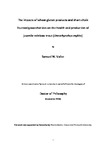The impacts of wheat gluten products and short-chain fructooligosaccharides on the health and production of juvenile rainbow trout (Oncorhynchus mykiss)
| dc.contributor.supervisor | Merrifield, Daniel | |
| dc.contributor.author | Voller, Samuel W. | |
| dc.contributor.other | Faculty of Science and Engineering | en_US |
| dc.date.accessioned | 2017-08-15T14:52:33Z | |
| dc.date.issued | 2017 | |
| dc.date.issued | 2017 | |
| dc.identifier | 10110645 | en_US |
| dc.identifier.uri | http://hdl.handle.net/10026.1/9826 | |
| dc.description.abstract |
The impacts of wheat gluten products and short-chain fructooligosaccharides on the health and production of juvenile rainbow trout (Oncorhynchus mykiss) Samuel W. Voller Through the implementation of in vivo feeding trials, the efficacy of three wheat gluten (WG) products, vital (Amytex®), hydrolysed (Merripro®) and soluble hydrolysed (Solpro®) wheat gluten as replacement of soy protein concentrate, and scFOS prebiotic (Profeed®) supplementation were analysed to assess their impacts on intestinal health and production of juvenile rainbow trout. Microbial community analysis in experiment one revealed a degree of diet based modulation with 7.5% and 15% inclusions of wheat gluten (WG) products. Bacterial species diversity was significantly reduced with 15% hydrolysed wheat gluten (HWG) inclusion compared to the plant protein control and 15% vital wheat gluten (VWG) treatments, with sequenced OTUs dominated by the phylum Firmicutes and possible promotion of probiotic species. No detrimental effects were observed on intestinal morphology. These findings led onto a longer duration feed trial with a more holistic, higher resolution approach. Experiment two revealed modulation of the allochthonous intestinal microbiota, with increased proportions of Enterococcus and Weissella in the 10% and 20% VWG treatments. Bacillus and Leuconostoc relative abundances were significantly increased with 10% HWG and soluble hydrolysed (Sol) wheat gluten inclusions. HSP 70 transcripts were significantly down-regulated in all WG treatments compared to the basal soy protein concentrate treatment (SPC) and increased intraepithelial leukocyte counts were observed with 10% VWG inclusion. Growth performance was unaffected by 10% dietary inclusions of WG, however, FCR’s were significantly improved in the 20% VWG treatment compared to the 10% HWG and Soluble treatments. This led to the investigation of increased inclusion levels of WG products in experiment three. All WG treatments in experiment three yielded significantly improved growth performance. Somatic indices were significantly increased with 30% blended WG inclusion compared to the SPC treatment. Modulation of allochthonous intestinal microbiota was observed to a lower degree than the previous experiments, with a dose response observed with increasing blended WG inclusion. In the final experiment two basal diets (SPC and 20% Blended) and two scFOS supplemented diets (SPC + FOS and 20% Blended + FOS) were investigated for the effect on growth performance, gut health and allochthonous microbial population. Growth performance was unaffected, however, modulation of the allochthonous microbial population was observed with an apparent synergistic effect of scFOS supplementation in WG diets. This synergistic trend was also observed in the transcription level expression of immune relevant genes. 20% WG inclusion with additional scFOS supplementation observed significant down regulation of the pro-inflammatory cytokine TNF-α, as well as HSP 70, CASP 3 and Glute ST compared to the 20% Blend treatment. The present research demonstrates dietary inclusions of WG products, solely or blended, at the expense of soy protein concentrate to modulate the allochthonous microbial population, potentially promoting probiotic species, whilst reducing the levels of intestinal stress in juvenile rainbow trout. Supplementation of the prebiotic scFOS modulated the microbial populations, enhancing the proportion of potential probiotic species, and combined with WG inclusions, reduce intestinal and oxidative stress and inflammation biomarkers, with no observed deleterious effects. | en_US |
| dc.description.sponsorship | Tereos | en_US |
| dc.description.sponsorship | Plymouth University | en_US |
| dc.language.iso | en | |
| dc.publisher | University of Plymouth | |
| dc.subject | Aquaculture nutrition | |
| dc.subject | Plant Protein | |
| dc.subject | Prebiotics | |
| dc.subject | Trout | |
| dc.subject | Rainbow trout | |
| dc.subject | Aquaculture | en_US |
| dc.subject.classification | PhD | en_US |
| dc.title | The impacts of wheat gluten products and short-chain fructooligosaccharides on the health and production of juvenile rainbow trout (Oncorhynchus mykiss) | en_US |
| dc.type | Thesis | |
| plymouth.version | publishable | en_US |
| dc.identifier.doi | http://dx.doi.org/10.24382/422 | |
| dc.rights.embargodate | 2018-02-15T14:52:33Z | |
| dc.rights.embargoperiod | 6 months | en_US |
| dc.type.qualification | Doctorate | en_US |
| rioxxterms.version | NA |
Files in this item
This item appears in the following Collection(s)
-
01 Research Theses Main Collection
Research Theses Main


